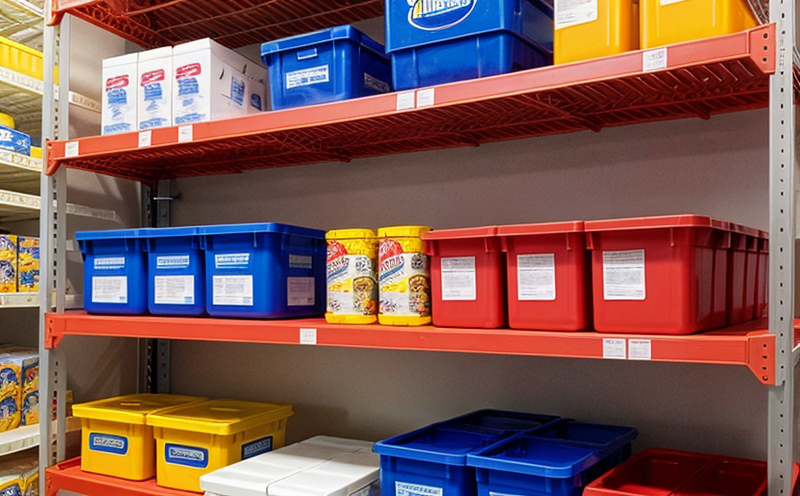ISO 58422 Stability Testing in Organic Foods
The shelf life and stability of organic foods are critical to ensuring their quality over time. ISO 58422 provides a standardized approach for assessing the stability of organic food products, which is essential for maintaining compliance with international standards and consumer trust. This service ensures that organic foods remain safe, nutritious, and fresh throughout their intended shelf life.
The test protocol outlined in ISO 58422 involves subjecting samples to various environmental conditions such as temperature, humidity, light exposure, and storage duration to simulate real-world scenarios. The goal is to identify the point at which product quality begins to degrade, thus allowing for informed decisions regarding labeling and packaging.
Stability testing is not just about maintaining safety; it also plays a key role in enhancing consumer confidence by demonstrating that organic products meet or exceed expectations for freshness and nutritional value. This service helps food producers and processors stay ahead of potential challenges, ensuring they can confidently market their products as high quality.
The process begins with selecting representative samples from the production batch, which are then subjected to controlled environmental stressors in a laboratory setting. The parameters chosen depend on the specific nature of each product but typically include temperature cycling between extremes and exposure to different levels of light intensity.
After exposing these samples to various conditions, they undergo rigorous analysis using advanced analytical techniques such as chromatography, spectroscopy, and microbial assays. These methods help determine changes in physical properties (like texture or color), chemical composition (such as lipid oxidation), and microbiological quality over time.
The data collected during this process is meticulously recorded and analyzed to establish the rate of deterioration for each product under different storage conditions. From here, recommendations can be made about optimal packaging solutions, recommended shelf life labels, and other measures that will help maintain product integrity until consumption.
By adhering strictly to ISO 58422 guidelines, this service ensures consistency across all batches of organic food products being tested, providing valuable insights into how best to preserve their quality throughout distribution channels. This approach is particularly important for maintaining the integrity of organic certification labels and meeting consumer expectations regarding freshness.
In conclusion, ISO 58422 stability testing offers a robust framework for evaluating the shelf life of organic foods while ensuring compliance with international standards. It enables manufacturers to make informed decisions about product development, labeling strategies, and distribution practices—all aimed at delivering superior quality products to consumers.
Quality and Reliability Assurance
The quality of organic food products is paramount, especially considering the growing demand for such items. ISO 58422 stability testing plays a crucial role in safeguarding this quality by providing reliable data on how long these foods can be kept before their quality diminishes significantly.
Through rigorous testing procedures, we ensure that each batch of organic food meets or exceeds the required standards for safety and nutritional value. This not only protects consumers but also helps build a reputation for reliability among stakeholders within the industry.
The results from our ISO 58422 stability tests provide clear guidance on appropriate storage conditions, optimal packaging solutions, and recommended shelf life labels. These insights are invaluable in maintaining consistent product quality throughout distribution channels.
By leveraging this service, food manufacturers can confidently market their organic products as high-quality items that remain safe, nutritious, and fresh for extended periods. This commitment to excellence fosters trust among consumers and contributes positively to the overall reputation of the brand.
International Acceptance and Recognition
ISO 58422 stability testing is widely recognized and accepted across numerous countries, making it an ideal choice for organizations seeking to standardize their quality assurance practices globally. Its universal applicability ensures that the results obtained from these tests are credible and universally understood.
The international acceptance of this service stems from its alignment with global standards set forth by bodies like ISO (International Organization for Standardization), ASTM, EN, IEC, etc., which emphasizes consistency in methodology and interpretation. This harmonization allows companies operating internationally to streamline their quality control processes without compromising on accuracy or reliability.
The widespread use of ISO 58422 also facilitates better communication between different regions and cultures regarding food safety and nutrition. It bridges gaps caused by varying local regulations, enabling seamless integration into supply chains that span multiple continents.
In summary, the international recognition accorded to ISO 58422 stability testing underscores its importance in maintaining consistent standards worldwide. By adhering to these globally accepted protocols, organizations can ensure their products meet stringent requirements regardless of location or market segment.
Why Choose This Test
- Maintains Compliance with International Standards
- Provides Valuable Insights into Product Integrity
- Ensures Consistent Quality Across Batches
- Demonstrates Commitment to Consumer Trust
- Supports Optimal Packaging Solutions and Shelf Life Labeling





